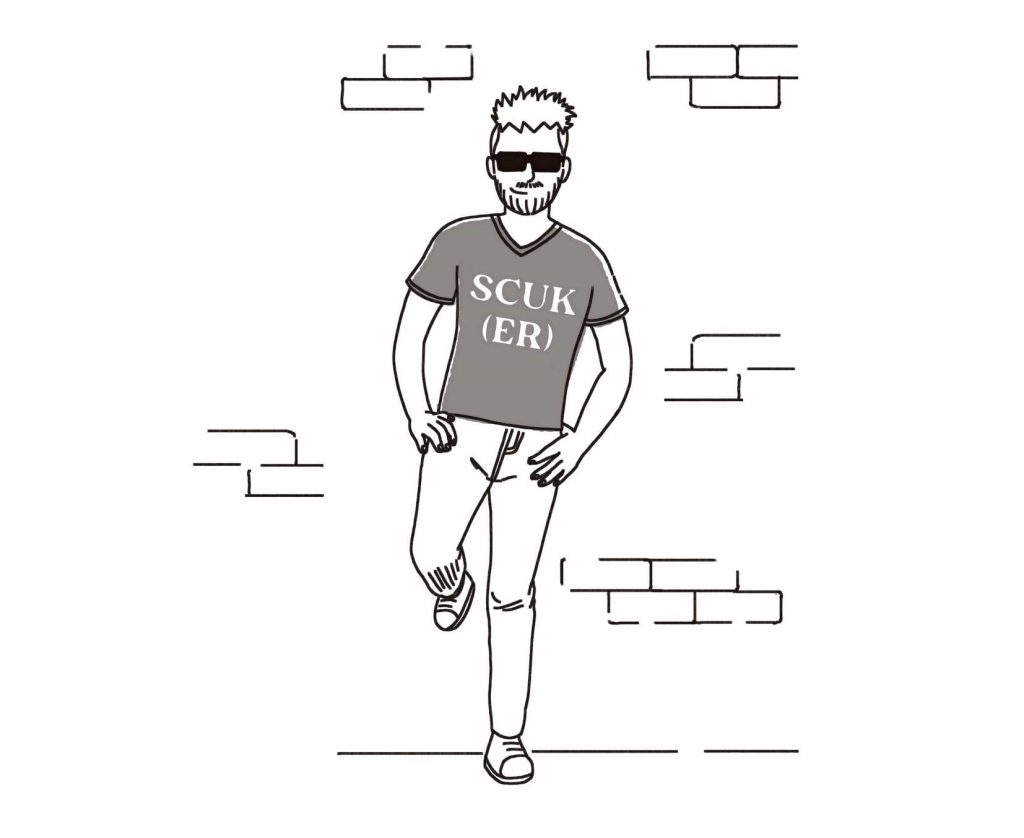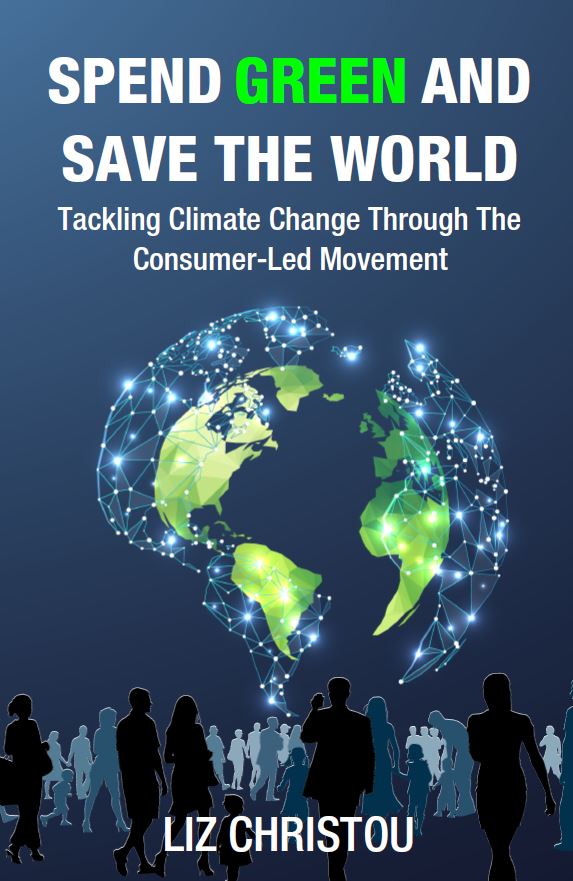An excerpt from Chapter 3 of Spend Green and Save The World by Liz Christou
Overconsumption
Unless you’re a bit of a hoarder, you can probably look around your home and find many pointless possessions that you’ve bought or been given. If you can’t see them, then I’d bet money the last time you moved home, you were amazed at how much tat came out of the cupboards. It probably filled up boxes and boxes, and some of them were so full of who-knows-what that you haven’t bothered to unpack them since.
We’ve all been there, rushing around the January sales to snap up any ‘bargains’ after we’ve just virtually bankrupted ourselves on Christmas. The sad thing is that the consumer-driven lifestyle we’ve grown accustomed to, has us convinced that we’re doing ourselves a favour.
It’s worth taking a minute to think about what ‘consumer-driven lifestyle’ actually means. We hear the word consumer all the time; it’s completely normal to be called a consumer on a daily basis. We don’t even think twice about it. Within our current system, the expectation is that to consume is our primary function. As a result – whether it be clothes, gadgets, furniture or TV – we’re constantly consuming something.
This does huge damage to the climate due to all the greenhouse gasses emitted during the design, production, transportation, storage, retail, use, and finally disposal of the products. A lot of which don’t add any real value to our lives. The Consumer Goods Forum[i] notes that the consumer goods sector is accountable for a whopping 60 percent of global emissions (this includes food, which we’ll cover in a separate chapter).
For more guidance on how to get out of the consumer mindset, to benefit the climate and ourselves, read the breakout box. To start making change happen, head to the practical solutions.
Why do we buy, buy, buy?
Since the advent of capitalism, the system has evolved to perpetuate our innate thirst for more. This is done by constantly reinforcing the message that we need material things to rise up the status ranks. And that rising up the status ranks is a highly desirable thing to do.
I think most of us have the feeling that advertisers turn our psychology against us. They make us feel lacking if we don’t have something, and it preys on our insecurities. What I didn’t realise, until I recently watched a TED talk by Kate Raworth, is that the process is more deliberate than we realise.[ii] She thinks we’re socially addicted to growth and that it’s due to consumer propaganda created by Sigmund Freud’s nephew, Edward Bernays. In her words, Bernays “realised that his uncle’s psychotherapy could be turned into very lucrative retail therapy, if we could be convinced to believe that we transform ourselves every time we buy something more.”
Perhaps you accept that advertising has conspiratorial roots, perhaps not. But it’s undeniable that we’re constantly being influenced to believe that we’ll be more desirable, interesting, or happy, if we buy things. And our primal, competitive, insecure side can’t resist that message.
However it originated, this pattern of behaviour is now encouraged (to put it mildly) by those who benefit most from it. In the US, in the 70s, the number of ads the average person saw every day was around 500. In 2017, marketing experts estimate the figure to be between 4,000 and 10,000.[iii]
Can we buy happiness?
We’re definitely told to think that what we buy defines who we are. I have to say that I kind of agree, only not in the way the adverts suggest.
Ladies, it’s clear that buying Tampax tampons isn’t going to make you want to go rollerblading in white hot pants. And I’m sorry to break it to any teenage boys reading this, but spraying some Lynx on yourself isn’t going to make a hundred semi-naked girls run at you.
We all know this, but thousands of adverts chipping away at our brain every single day takes its toll.
We end up actually believing that wearing a French Connection top makes us a little bit cooler, all because they put some slick adverts on TV and in glossy magazines, and charge you enough to believe they’re worth more. They’ve managed to convince us that wearing a label with a four-letter swear word – spelt wrongly – makes us a more worthwhile person. It’s fairly obvious that we’re all being done. Or as Macklemore puts it, paying $50 for a t-shirt is “getting tricked by bizzzness”.

In ‘Prosperity without Growth’, Tim Jackson puts it like this, “We’re certainly not the first society to endow mere stuff with symbolic meaning. But we are the first to hand over so much of our social and psychological functioning to materialistic pursuits.” For me, this quote really brought home the sad reality of our situation. We like to think of our society as being more advanced than any in history. But in taking a step back to look at ourselves, we see that we have our priorities all messed up to the detriment of our personal wellbeing and that of our collective home.
Despite all the attempts at brainwashing, we can’t escape the problem that shopping is ultimately unfulfilling. Consuming is a distraction from the general discontentment that we feel because we’re not accessing the higher part of our brains; the part that wants to create rather than consume. The part that feels energised by learning and doing new things, by being outdoors and nurturing relationships. No wonder so many people today are feeling depressed, and why practices like yoga and meditation have become popular. We just want some space to breathe, or attempt to minimise the incessant internal dialogue brought on – at least in part – by marketing campaigns that are designed to make us feel lacking if we don’t buy their products.
It isn’t just common sense that tells us this. According to the American Psychological Association, consumption “can promote unhappiness because it takes time away from the things that can nurture happiness, including relationships with family and friends.”[iv] And, despite becoming better off in the last few decades, our wellbeing has not increased.
Be the change and change what you buy
“Knowledge is Power” as Francis Bacon said. Ironically, he lacked much of it at the time; he thought that people can, and should, control nature. By understanding the root cause of the climate issue – ‘The Capitalism Catch-22’ – we’re aware that the behaviour the system perpetuates isn’t coming from the higher brain. So we can and should analyse it before acting on it.
If we want to avoid catastrophic climate change and have a good chance to improve our wellbeing in the process, we can use that knowledge to make sure our buying choices define who we are. But not in a spoon-fed, superficial way. Instead, we can make conscious choices about what to buy, and what not to.
And, excitingly, when we make conscious choices about what to spend money on, these things can represent what we stand for and demonstrate our true values. When others notice what we do and don’t purchase, it exhibits the positive impact we want to have on the world.
* * * * *
Learn more about Spend Green and Save The World by Liz Christou
[i] Low Carbon Solutions for a Sustainable Consumer Goods Sector. The Consumer Goods Forum. https://www.theconsumergoodsforum.com/wp-content/uploads/2017/12/low-carbon-solutions-sustainable-consumer-goods.pdf
[ii] A healthy economy should be designed to thrive not grow. Kate Raworth. Ted. https://www.ted.com/talks/kate_raworth_a_healthy_economy_should_be_designed_to_thrive_not_grow?language=en
[iii] Finding Brand Success In The Digital World. Forbes. https://www.forbes.com/sites/forbesagencycouncil/2017/08/25/finding-brand-success-in-the-digital-world/#3f8674c5626e
[iv] Consumerism and its discontents. American Psychological Association. https://www.apa.org/monitor/jun04/discontents

